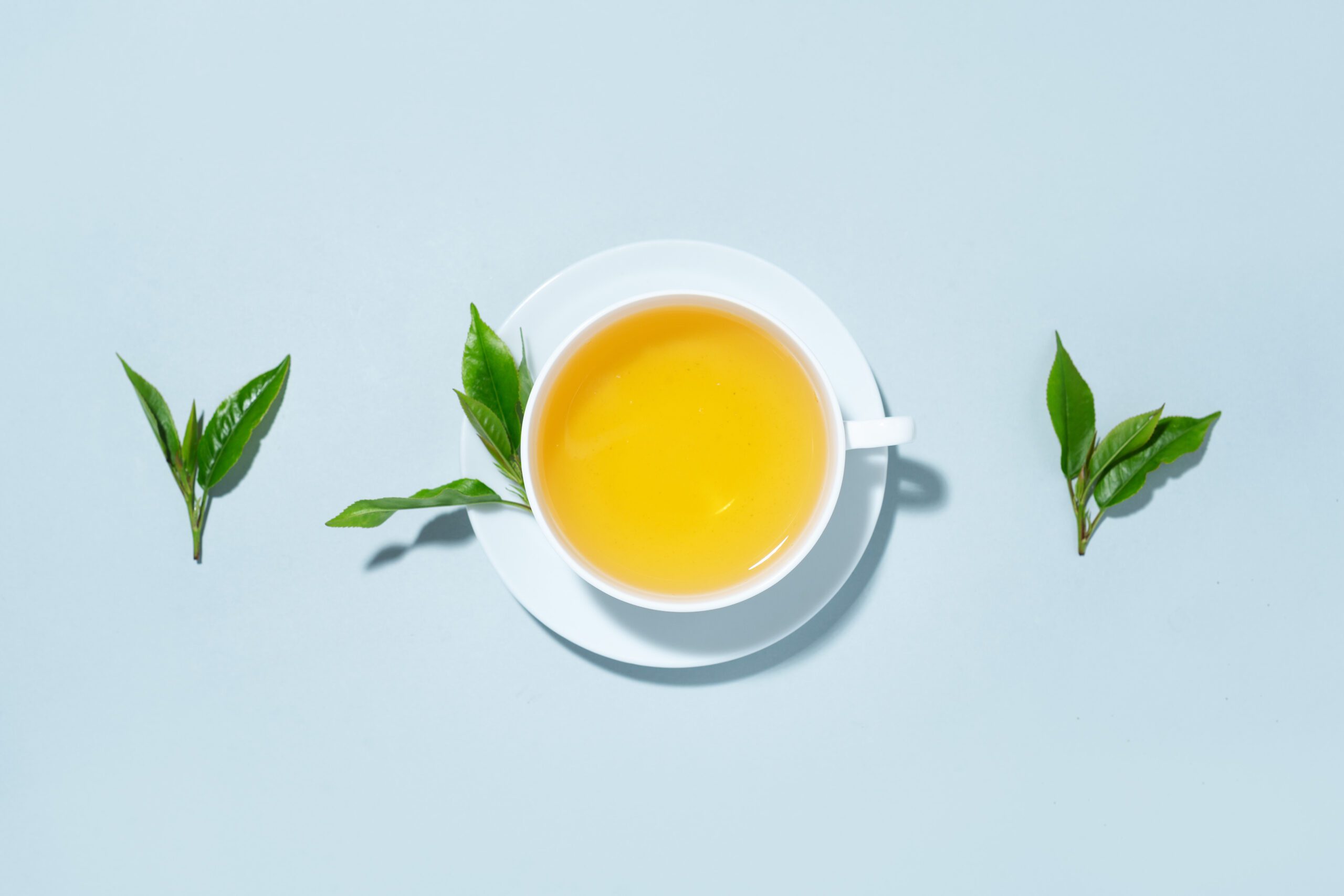In Ayurveda, tea is often considered beneficial for health when consumed in moderation and prepared with appropriate ingredients. The specific health impacts of tea can change contingent upon elements, for example, the sort of tea, the spices and flavors utilized, and the singular’s constitution (dosha). Tea is well-known for its calming and relaxing effects on the mind and body. It is often used as a natural remedy for reducing stress, anxiety, and tension. Tea is a gentle and versatile herbal remedy that can be enjoyed for its potential health benefits and soothing properties. It is generally safe for most people when consumed in moderation.
The different types of tea which are beneficial for health according to Ayurveda are discussed below:
Ginger Tea
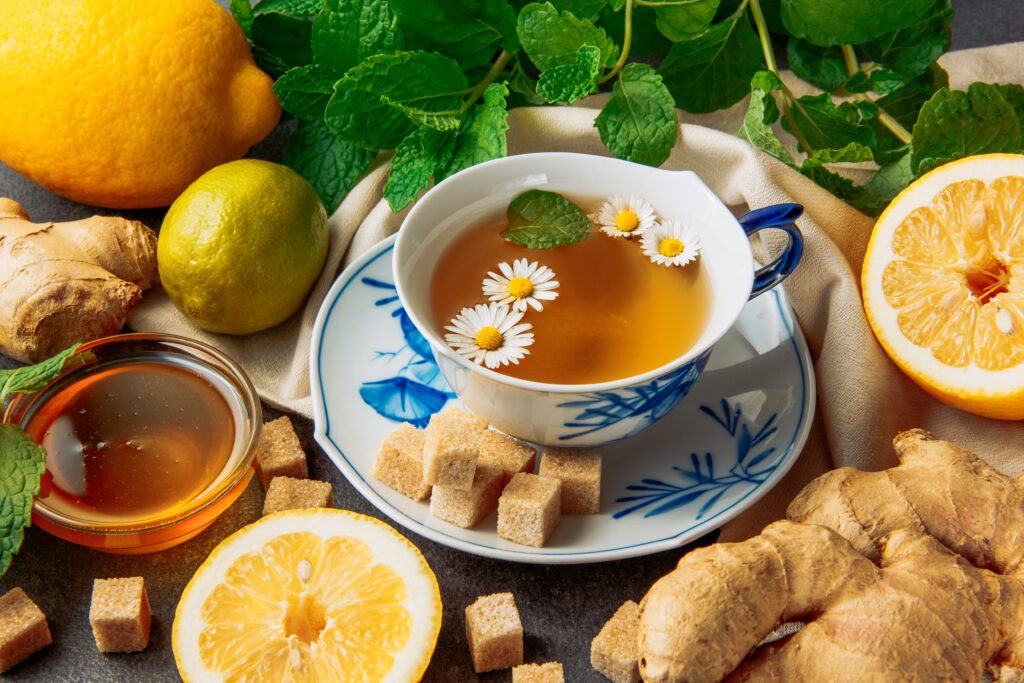
In Ayurveda, ginger is considered warming and balancing for the body, particularly for individuals with Vata or Kapha imbalances. It can help counteract the cold and heavy qualities associated with these doshas, promoting warmth, circulation, and energy flow. Ginger tea is also very good for your health according to Ayurveda .
Ginger contains bioactive compounds with potent anti-inflammatory properties, making it beneficial for reducing inflammation and pain associated with conditions such as arthritis, muscle soreness, and menstrual cramps. Drinking ginger tea regularly may help alleviate symptoms of inflammation and promote overall well-being.
Here are some key aspects of ginger tea in Ayurveda:
- Warming and Balancing
- Anti-inflammatory
- Immune Support
- Digestive Aid
- Stress Relief
- Respiratory Health
- Blood Sugar Regulation
Ginger tea is fantastic in cold months, and delicious after dinner. You can add a little lemon or lime, and a small amount of honey and make a great beverage.
Making ginger root tea with fresh ginger takes a little more preparation but tends to deliver a more intense, lively brew.
How to Make Ginger Tea
- Buy a piece of fresh ginger.
- Trim off the tough knots and dry ends.
- Carefully peel it.
- Cut it into thin, crosswise slices.
- Put a few of the slices in a cup or mug.
- Pour in boiling water and cover.
To get all the goodness of the ginger, let the slices steep for at least 10 minutes.
Reference Blog : https://www.hopkinsmedicine.org/health/wellness-and-prevention/ginger-benefits
Chamomile Tea
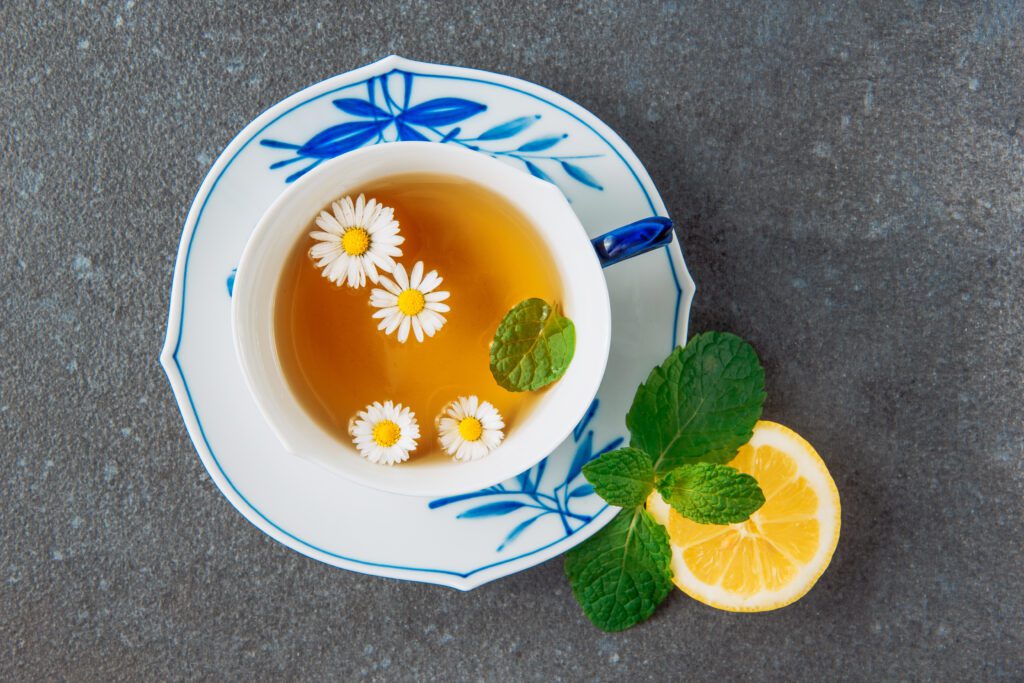
Chamomile tea is a popular herbal infusion made from the dried flowers of the chamomile plant, scientifically known as Matricaria chamomilla or Chamaemelum nobile. Chamomile tea is notable for its quieting and loosening up consequences for the brain and body. It contains mixtures, for example, apigenin, which have been read up for their capability to advance unwinding and diminish tension. Drinking chamomile tea before sleep time might assist with further developing rest quality and advance sensations of serenity and unwinding.
Chamomile tea is sometimes used topically as a rinse or compress for skin conditions such as eczema, dermatitis, and minor irritations. Its anti-inflammatory and soothing properties may help calm irritated skin, reduce redness, and promote healing. Chamomile tea is also very good for your health according to Ayurveda .
Its potential benefits according to Ayurveda:
- Calming and Relaxing
- Digestive Support
- Anti-inflammatory Properties
- Balancing Pitta Dosha
- Respiratory Support
How to Make Chamomile tea
- Add dried chamomile to your infuser or place a tea bag in your cup.
- Heat your water.
- Dispose of the warm water in your mug (in the event that you added it beforehand), and add the bubbling water.
- Steep the tea for five minutes. You can now enjoy your tea.
Peppermint Tea
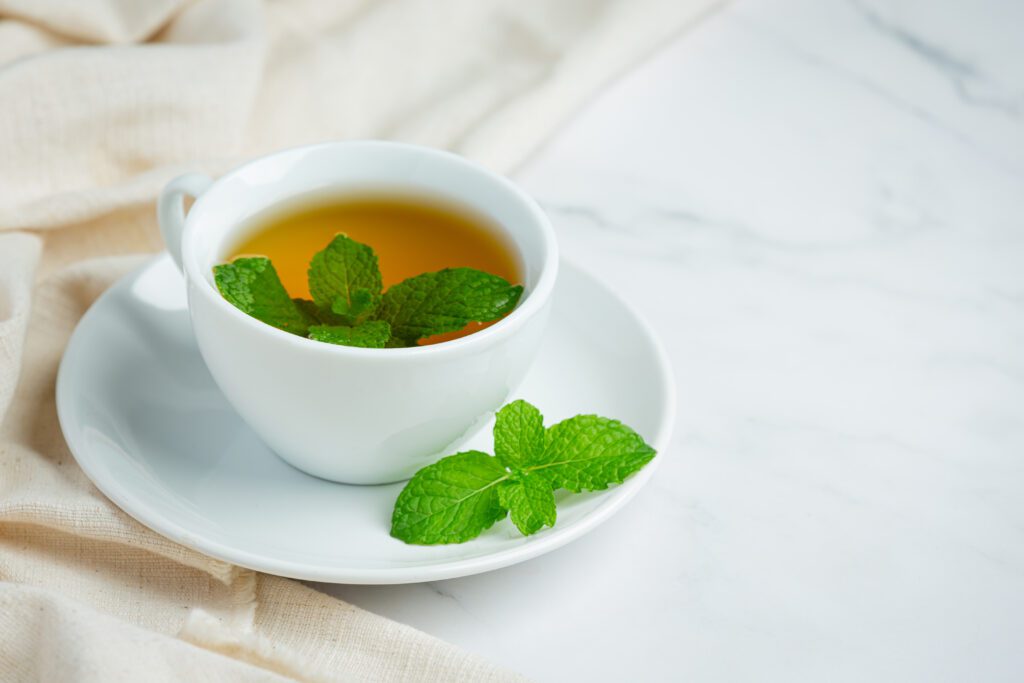
Peppermint tea is well-known for its ability to support digestive health. It contains compounds such as menthol, which have antispasmodic properties that can help relax the muscles of the digestive tract. Drinking peppermint tea may help alleviate symptoms of indigestion, gas, bloating, and stomach cramps. Peppermint tea may have decongestant and expectorant properties, making it beneficial for relieving coughs, congestion, and respiratory discomfort.
Its potential benefits according to Ayurveda:
- Headache Relief
- Relief from Nausea
- Respiratory Support
- Oral Health
- Mental Clarity and Alertness
How to make Peppermint tea
- Ingredients:
- Fresh peppermint leaves or dried peppermint leaves
- Water
- Boil Water:
- Bring water to a boil in a kettle or pot.
- Prepare Peppermint Leaves:
- If using fresh peppermint leaves, rinse them thoroughly under cold water to remove any dirt or debris.
- If using dried peppermint leaves, measure out the desired amount (usually 1 teaspoon of dried leaves per cup of water).
- Steep Peppermint Leaves:
- Place the peppermint leaves in a teapot, mug, or heatproof container.
- Pour the boiling water over the peppermint leaves.
- Cover and Steep:
- Cover the container with a lid or plate to trap the steam and aromas.
- Allow the peppermint leaves to steep in the hot water for about 5 to 10 minutes, depending on your preference for strength.
- Strain :
- If desired, strain the tea to remove the peppermint leaves before serving.
- Alternatively, you can leave the leaves in the tea for added flavor and aroma.
- Serve and enjoy your peppermint tea, Peppermint tea can be enjoyed hot or cold, depending on your preference.
Green Tea
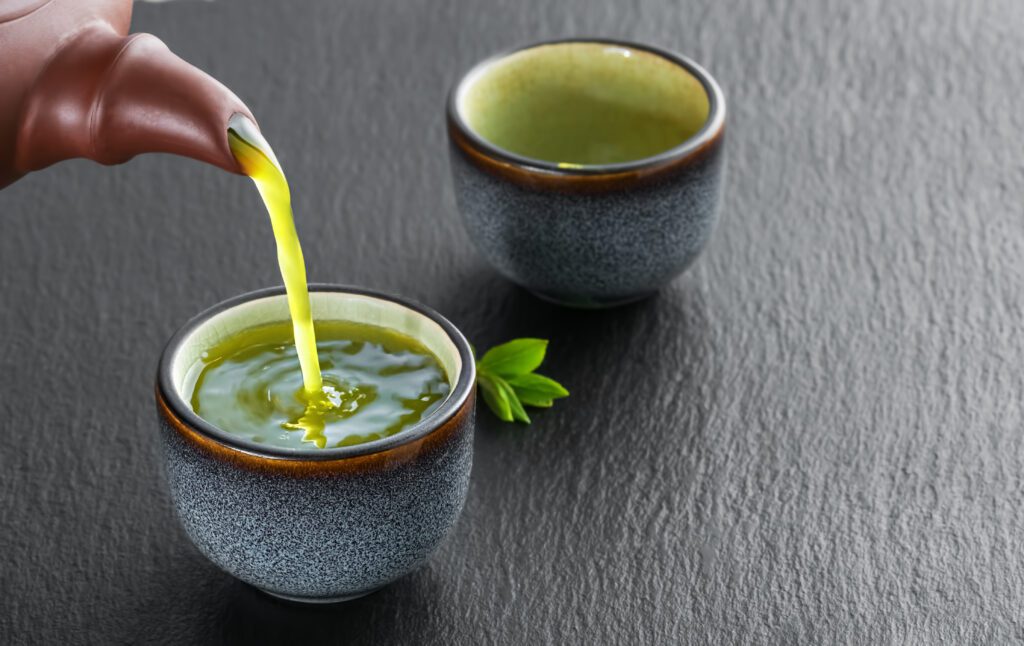
In recent years, it has also gained popularity as a health drink. This includes potent antioxidants called catechins, which may help protect against cancer and drinking green tea may even help you lose weight. green tea has been associated with improved brain function and cognitive health, thanks to its caffeine content and the amino acid L-theanine, which work synergistically to enhance alertness and concentration while promoting relaxation. Moreover, green tea’s antioxidant properties may help protect against oxidative stress and inflammation, potentially reducing the risk of chronic diseases such as cancer and diabetes. Regular consumption of green tea has also been linked to weight management and metabolic health, as it can boost metabolism and aid in fat oxidation.
How to make Green tea
- Ingredients:
- Green tea leaves (1 teaspoon per cup)
- Water
- Boil Water:
- Bring fresh, filtered water to a boil in a kettle or pot.
- Cool Water:
- Allow the boiled water to cool slightly for about 1-2 minutes. Green tea is delicate, and using water that’s too hot can result in a bitter taste.
- Prepare Tea Leaves:
- Measure out 1 teaspoon of green tea leaves per cup of water.
- Place Tea Leaves:
- Place the green tea leaves in a teapot, mug, or infuser basket.
- Pour Water:
- Pour the hot water over the green tea leaves.
- Steep:
- Allow the green tea leaves to steep in the hot water for about 2-3 minutes. Steeping time can vary depending on the desired strength of the tea and personal preference.
- Strain (Optional):
- If using loose leaf tea, strain the tea to remove the leaves before serving.
- If using tea bags, simply remove the tea bags from the water.
- Serve:
- Pour the green tea into cups or mugs.
With its refreshing taste and diverse health benefits, incorporating green tea into one’s daily routine can contribute to a healthier lifestyle and improved overall well-being.
Black Tea
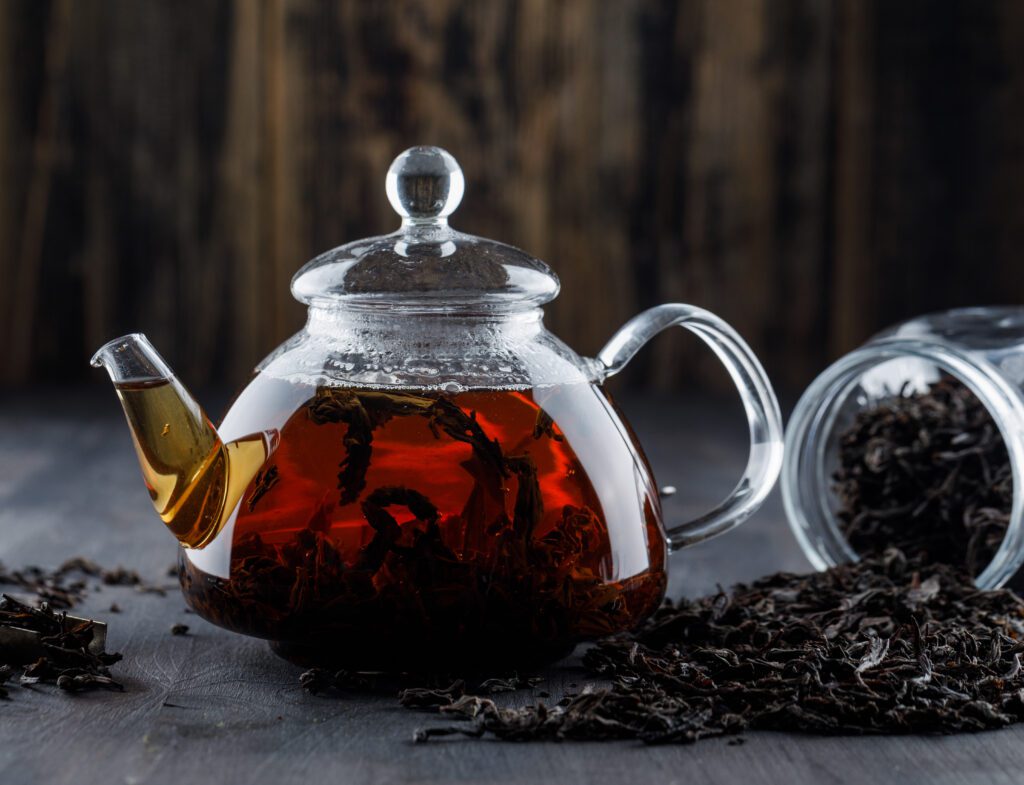
Black tea, similar to green tea, is gotten from the leaves of the Camellia sinensis plant. Black tea is a delightful and flexible drink that offers a scope of potential medical advantages. Integrating black tea into a reasonable eating regimen, alongside other solid way of life decisions, can add to generally speaking prosperity and may assist with lessening the gamble of different ongoing sicknesses. Black tea gives different kinds of benefits to our health according to Ayurveda .
- Boil Water: Bring fresh, filtered water to a rolling boil in a kettle or pot.
- Prepare Tea Leaves: Measure out 1 teaspoon of black tea leaves per cup of water.
- Place Tea Leaves: Place the black tea leaves in a teapot, mug, or infuser basket.
- Pour Water: Pour the hot water over the black tea leaves.
- Steep: Allow the black tea leaves to steep in the hot water for about 3-5 minutes. Adjust steeping time based on personal preference for strength.
- Strain (Optional): If using loose leaf tea, strain the tea to remove the leaves before serving.
- Serve: Pour the freshly brewed black tea into cups or mugs.
- Enjoy: Sip and enjoy your hot black tea!
Black tea leaves go through a broad oxidation process, uncovering the phones inside the passes on to oxygen. Specialists accept this oxidation might give Black tea a few unexpected advantages in comparison to green tea (which gets no oxidation). Both oolong and white teas go through halfway oxidation.
Analysts have concentrated on the impacts of tea on disease for quite a long time. They’ve found that the polyphenols in tea truly do assume a part in battling specific kinds of cancer.
Frequently Asked Questions About Tea
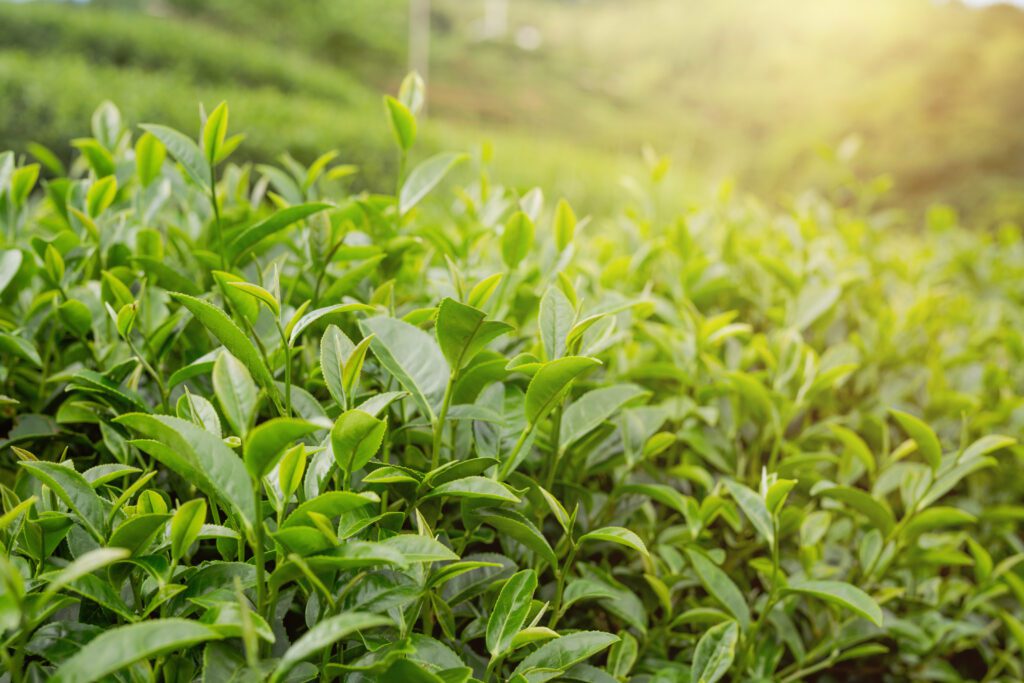
1. Can drinking tea help one lose weight?
Drinking tea can potentially aid in weight loss as part of a balanced and healthy lifestyle. Some teas, such as green tea, contain compounds like catechins and caffeine that may help boost metabolism temporarily. Herbal teas like peppermint or chamomile may help control appetite and reduce cravings. Also, be careful of adding extreme measures of sugar, honey, or different sugars to your tea, as this can refute its expected advantages and add to weight gain.
2. What is the difference between black tea and red tea?
Black tea is derived from the Camellia sinensis plant and undergoes full oxidation, resulting in a bold and robust flavor, while red tea typically refers to Rooibos tea, which comes from the Aspalathus linearis plant and is known for its naturally sweet and mild taste, as well as being caffeine-free.
3. Does tea contain caffeine?
Yes, tea does contain caffeine. Green Tea Contains moderate levels of caffeine, typically ranging from 15 to 30 milligrams per 8-ounce cup. Black tea has higher caffeine content compared to green tea, with about 30 to 60 milligrams per 8-ounce cup. White tea Contains a similar amount of caffeine to green tea, averaging around 15 to 30 milligrams per 8-ounce cup. Herbal teas such as chamomile, peppermint, hibiscus, and rooibos are naturally caffeine-free.
4. What is cold brewing?
Cold brewing is a popular method for creating refreshing and flavorful cold beverages, offering a unique alternative to traditional hot brewing techniques. It is a method of preparing beverages, particularly coffee and tea, by steeping them in cold water over an extended period of time, usually several hours to overnight.
5. Does tea with milk cause acidity?
Tea with milk can potentially cause acidity in some individuals, but it largely depends on various factors such as the type of tea, the amount of milk added and overall dietary habits.
6. How do you reduce the acidity in tea?
Choose Low-Acid Tea Varieties
Reduce Brewing Time
Use Cooler Water Temperature
Choose Quality Tea Leaves
Read More : https://yogayurvedaa.com/can-ayurveda-cure-arthritis/
